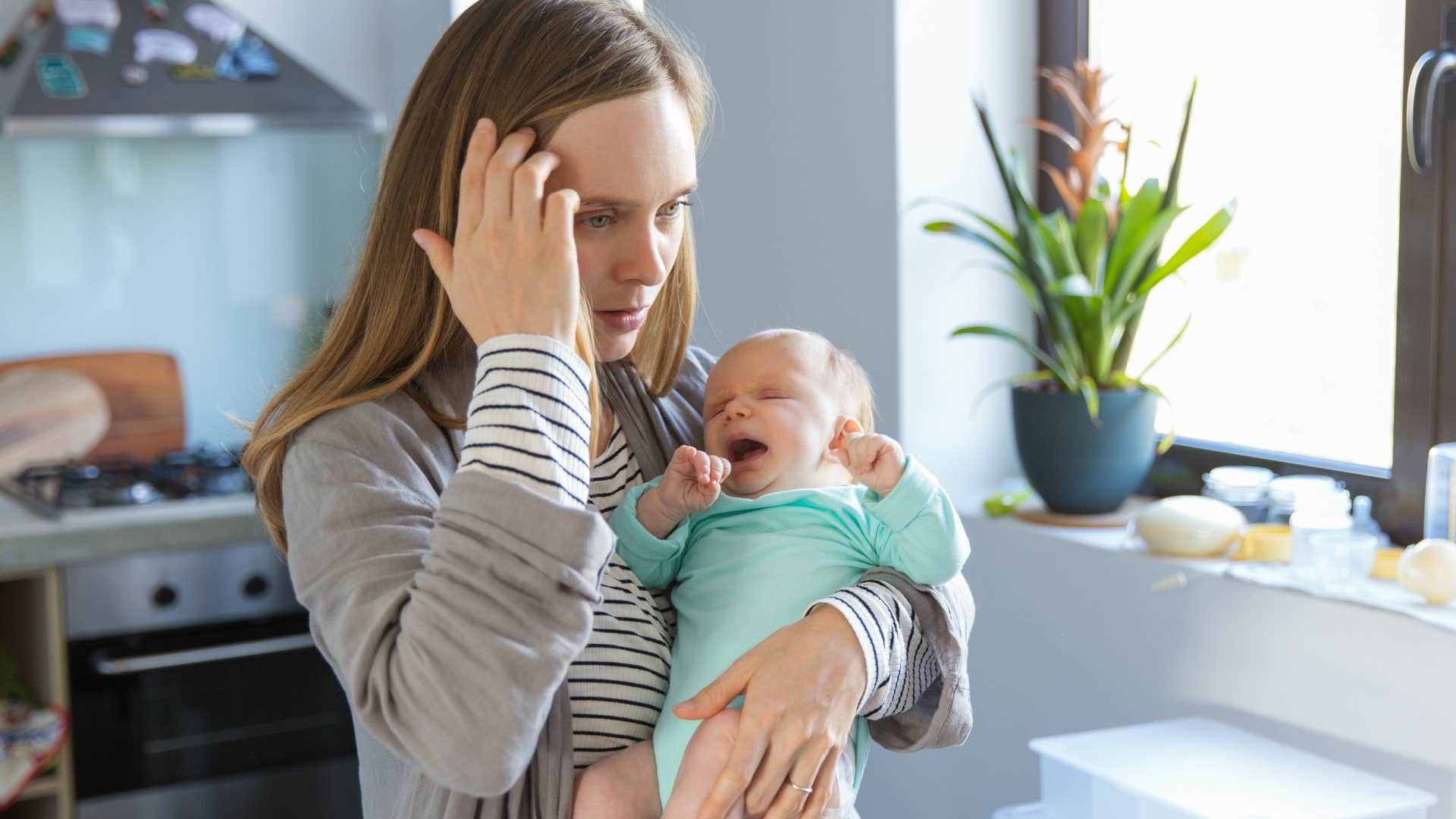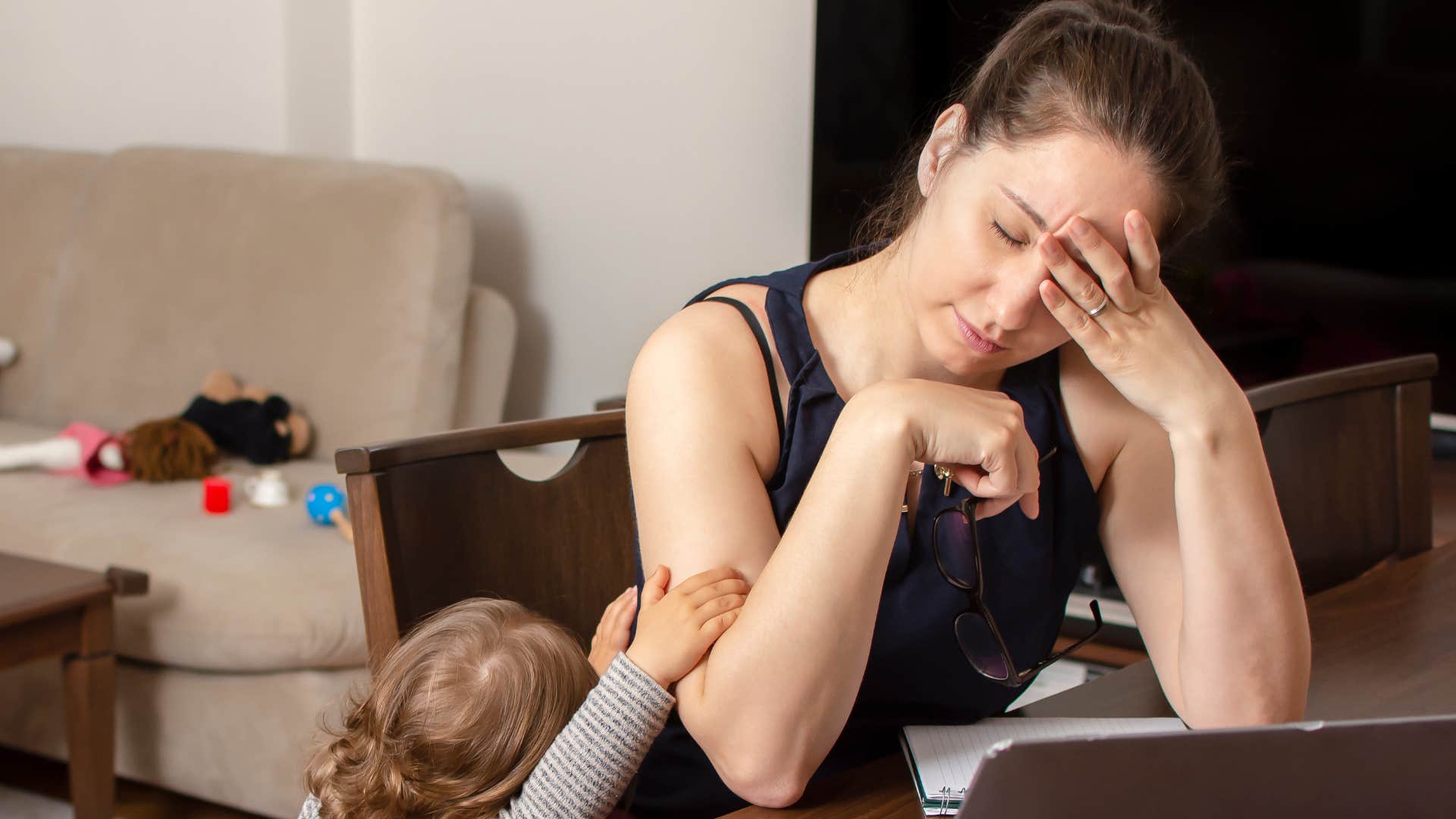Women Who Can't Stand Their Husbands After Having Kids Usually Have These 11 Reasons
They're grappling with more than just resentment at home.
 StratfordProductions | Shutterstock
StratfordProductions | Shutterstock While most relationships, whether there are children in the picture or not, fluctuate the most in the first decade together, according to a study from Psychological Bulletin, the most change many marriages face is the entrance into parenthood. Another investigation from the Journal of Personality and Social Psychology, these changes are often sudden, but not entirely unexpected.
From navigating the stress of raising a child, to experimenting with new roles, and even coping with internal dilemmas that parenthood sparks, it can be a struggle to multitask between being a great parent and an even better spouse. Of course, women who can't stand their husbands after having kids usually have unique reasons of their own, prompted by changes in emotional labor, internal and emotional battles of their own, and childhood trauma.
Here are 11 reasons women who can't stand their husbands after having kids usually have
1. They don't feel like their concerns are heard
 Nenad Cavoski | Shutterstock
Nenad Cavoski | Shutterstock
According to a study from the Journal of Personality and Social Psychology, many women tend to be more sensitive to struggles with conflict and communication in their marriages than their partners are, especially after having or introducing a child into a relationship dynamic. When they bring a child into their lives and shift priorities and focus, it's women that tend to notice a negative shift in communication first, feeling unheard and occasionally unvalued.
Of course, it's entirely possible for couples to stay close and vulnerable during this new stage of parenting, according to a 1995 study, but generally takes a level of pre-existing closeness, openness, and resilience that some partners lack until they're forced to develop it together.
It's one of the big reasons women who can't stand their husbands after having kids usually have because, especially in the face of a household where they're taking on most of the tangible responsibilities and tasks, they feel unheard without space for emotional vulnerability and communication.
2. They're resentful of the father role
 Tirachard Kumtanom | Shutterstock
Tirachard Kumtanom | Shutterstock
From unmet divisions of labor, like a study from Pew Research Center suggests, deepening at the expense of women in heteronormative relationships, to changes in relationship priorities, many women are resentful of their husbands because of their perceived father role.
Of course, every marriage and every father is different, but many women tend to take on larger emotional burdens in parenthood as mothers, compared to fathers with the same children.
They may perceive their husbands to be more "hands off" or even struggle with splitting up roles and responsibilities. For men who perceive themselves to be secondary parents to their female partners and "babysitters" to their own kids, of course their partners will be resentful, but many women even struggle with staying close to their healthy and competent husbands.
3. They never had a healthy role model
 fizkes | Shutterstock
fizkes | Shutterstock
Many women who struggle to bond and stay close with their husbands after having kids simply don't know how to act or behave. If they've never had a role model to guide them or parents who maintained a healthy relationship together, even after introducing kids into their home, it takes a lot of personal self-awareness and growth to excel themselves.
According to a study from the Journal of Marriage and Family, parental divorce and marriage dissatisfaction after having kids is intergenerational in many ways. Children who never learned how to excel — from being taught how to love or watching healthy modeled relationships from their parents — are essentially set up to fail in their adult relationships.
Of course, it's more nuanced than simply "watching and learning" — many people struggle with communication, self-esteem, and even emotional vulnerability in their relationships because of their parents and upbringing, adding strain to the already all-encompassing stress of parenthood.
4. They're grappling with physical struggles
 Mangostar | Shutterstock
Mangostar | Shutterstock
From dealing with postpartum to navigating an entirely new relationship with their body, especially from childbirth or taking on the mother role, many women can't help but feel disconnected from and sometimes resentful of their husbands in the face of physical and emotional turmoil.
Alongside research that suggests the more children a couple has the less likely they are to feel satisfied in their relationships, mothers also tend to be more unhappy than their male partners. Postpartum depression can affect both partners, but for mothers dealing with both emotional and physical changes and struggles, it can be one of the reasons they struggle to maintain a healthy connection with their spouse.
5. They have a larger share of childcare responsibilities
 lenetstan | Shutterstock
lenetstan | Shutterstock
Outside of household and relationship responsibilities — from chores to facilitating emotional conversations — that women tend to take on more than their male counterparts, many women feel resentful of their spouses over childcare.
Especially when childcare responsibilities aren't discussed prior to having children, women who take on the majority of these burdens experience more marital dissatisfaction and stress, according to a 1992 study.
Women who can't stand their husbands after having kids may be grappling with more stress and responsibilities in the face of motherhood, but when they also feel unheard and unsupported by their partner, it only adds to the disconnection they face in their relationships.
6. They're sleep deprived
 ErsinTekkol | Shutterstock
ErsinTekkol | Shutterstock
According to a 2022 study, many women dealing with sleep deprivation in early stages of parenthood tend to prioritize their children above themselves, sacrificing their own internal and emotional well-being for the health of their children. Especially if they don't feel supported by their partner, the symptoms of this can negatively affect their relationship, sparking disconnection and resentment at home.
Considering women also tend to adopt more responsibility caring for their child during the night, it's not surprising that the side effects — from fatigue, to exhaustion, and even irritability — tend to negatively affect their relationships.
7. They feel disconnected from their identity
 Josep Suria | Shutterstock
Josep Suria | Shutterstock
While there are a number of benefits that many women experience when adopting the roles and responsibilities of motherhood, it's also common for them to struggle with a loss of personal identity. From being forced to set their own passions and hobbies to the side to feeling less prioritized in a marriage, women who can't stand their husbands after having kids usually have these reasons.
Whether it's a casual relationship or a marriage, it's important that both partners have a personal sense of identity outside of their connection. If everything you enjoy, appreciate, and spend time doing is in the context of your partner, relationship struggles, rough patches, and arguments can feel like a personal attack on your entire life.
8. There's a lack of intimacy
 StockPhotoDirectors | Shutterstock
StockPhotoDirectors | Shutterstock
With a lack of mutual understanding, time, and energy, many partners fall out of touch in early parenthood because of a loss of physical and emotional intimacy. They're pouring so much time and energy into an entirely new person — their child — that investing it into each other needs to be an intentional choice and habit.
It's one of the big reasons women who can't stand their husbands after having kids usually have, as they don't feel loved or prioritized by their partners in the face of lacking intimacy.
9. They're tired of telling them what to do
 Perfect Wave | Shutterstock
Perfect Wave | Shutterstock
When you become a new mother, the last thing you want is to feel pressured into parenting your spouse — telling them what to do, how to behave, and how they should act, even if you have no idea yourself. Ironically enough, many men lose interest in their wives because of their "nagging" or internal feelings of childishness in the face of these requests.
So, even though women feel pressured to monitor their husbands' behaviors and even tell them what to do in the early stages of parenthood, it actually further disconnects and frustrates them on both sides of the aisle.
10. They have different ideas about parenting styles
 NDAB Creativity | Shutterstock
NDAB Creativity | Shutterstock
From different expectations for their kids, to resentment, and undermining each other's authority, partners with differing views on how they should parent their child tend to struggle in their personal relationships. They're not just facing conflict and resentment when they're alone, but also around their kids, in ways that can spark further disconnection and confusion for everyone involved.
Of course, it's not always easy to make compromises after having kids about how you want them to be raised, which is why it's important to have these hard conversations and get on the same page early on, to avoid resentment and mistrust down the road.
11. They're battling with financial stress
 PeopleImages.com - Yuri A | Shutterstock
PeopleImages.com - Yuri A | Shutterstock
According to a study from the Journal of Consumer Psychology, financial uncertainty and instability doesn't just spark more stress and anxiety for married couples at home, it also tends to sabotage healthy communication. In fact, the couples who need the hard conversations about money at home also tend to be the least likely to have them — grappling with resentment, disconnection, and stress in their relationships.
Women who can't stand their husbands after having kids may simply be feeling misheard because of misaligned communication styles or love languages, but it's also possible they're struggling with a myriad of things — from financial troubles, to a loss of identity, and even personal physical and emotional turmoil.
Zayda Slabbekoorn is a staff writer with a bachelor’s degree in social relations & policy and gender studies who focuses on psychology, relationships, self-help, and human interest stories.

